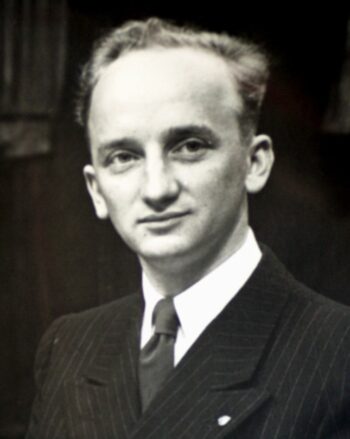Ferencz, Benjamin

Benjamin B. Ferencz (11 March 1920 – 7 April 2023) was a Hungarian-born American Jew who graduated from Harvard in 1943 with a law degree. After the war, he was tasked to set up a war-crimes branch in the US-occupied area of Germany. This branch was to collect incriminating evidence against German officials for the infamous Dachau Trials (see that entry). He later was appointed chief prosecutor of the Einsatzgruppen Trial.
In later years, he made several statements about the conditions he had set during his efforts to collect “evidence” for the show trials he prosecuted. Here are a few quotes that need no further comment (see Wear 2020 for sources):
“I was there for the liberation, as a sergeant in the Third Army, General Patton’s Army, and my task was to collect camp records and witness testimony, which became the basis for prosecutions. […] But the Dachau trials were utterly contemptible. There was nothing resembling the rule of law. More like court-martials. For example, they might bring in 20 or 30 people, line them up, each one with a number on a card tied around his neck. The court would consist of three officers. None of them had any legal education as far as I could make out; it was coincidental if they did. One officer was assigned as defense counsel, another as prosecutor, the senior one presiding. The prosecutor would get up and say something like this: We accuse all of you of being accomplices to crimes against humanity and war crimes and mistreatment of prisoners of war and other brutalities in the camp, between 1942 and 1943, what do you have to say for yourself? Each defendant would be given about a minute to state his case, which was usually, not guilty. One trial for instance, which lasted two minutes, convicted 10 people and sentenced them all to death.”
Benjamin Ferencz admitted in an interview that he used threats and intimidation to obtain confessions:
“You know how I got witness statements? I’d go into a village where, say, an American pilot had parachuted and been beaten to death and line everyone up against the wall. Then I’d say, ‘Anyone who lies will be shot on the spot.’”
On another occasion, he casually explained how he obtained confessions from SS men in captivity. He stripped them naked, and after a while explained to them:
“[N]ow listen, you and I are gonna have an understanding right now. I am a Jew – I would love to kill you and mark you down as auf der Flucht erschossen [shot while trying to escape], but I’m gonna do what you would never do. You are gonna sit down and write out exactly what happened – when you entered the camp, who was there, how many died, why they died, everything else about it. Or, you don’t have to do that – you are under no obligation – you can write a note of five lines to your wife, and I will try to deliver it.”
Needless to say, this way he got any confession he wanted.
Interviewed at age 85, he related the following anecdote, exposing his attitude toward the defendants he was prosecuting after the war (Brzezinski 2005):
“I once saw DPs [Displaced Persons] beat an SS man and then strap him to the steel gurney of a crematorium. They slid him in the oven, turned on the heat and took him back out. Beat him again, and put him back in until he was burnt alive. I did nothing to stop it. I suppose I could have brandished my weapon or shot in the air, but I was not inclined to do so. Does that make me an accomplice to murder?”
The cremation furnaces of wartime Germany were coke-fired, hence could not simply be “turned on.” Whether that story is true or not is secondary, however. Ferencz’s cold-blooded reveling in revenge atrocities is bone chilling, even if they occurred only in his mind.

You need to be a registered user, logged into your account, and your comment must comply with our Acceptable Use Policy, for your comment to get published. (Click here to log in or register.)